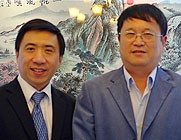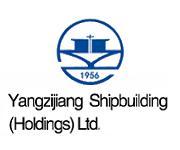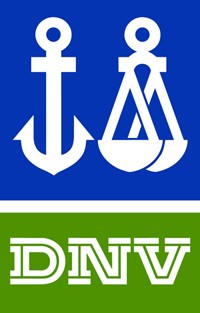Was The World’s ‘Northern-Most Island’ Erased From Charts?
by Kevin Hamilton (University of Hawaii) In 2021, an expedition off the icy northern Greenland coast spotted what appeared to be a previously uncharted island. It was small and gravelly,...




The secret of success – aiming to be No.1 and keeping a step ahead
JH: Yangzijiang Shipbuilding grew from a small shipyard into a group with several wholly owned or dominantly controlled shipbuilding enterprises and became a famous shipbuilding enterprise in both China and the rest of the world in the space of just ten years. In your opinion, what’s the secret of your company’s great success?
[pullquote align=”right”]James Huang, Deputy Regional Manager of DNV Maritime Greater China, interviewed Mr Ren Yuanlin, the founder of this shipbuilding giant, and discussed with him the secret of Yangzijiang Shipbuilding‘s great success.[/pullquote]
Ren Yuanlin: Yangzijiang Shipbuilding’s annual turnover was only about RMB 100 million in early 2000, and now the entire group is making an annual turnover of nearly RMB 30 billion. We could only build small river ships ten years ago, but now we have the capacity and capability to build post-Panamax bulk carriers, ultra large container vessels and VLCCs. We have achieved tremendous growth both in our corporate size and in financial terms within just ten years.
In my opinion, our success is based on the global transfer of manufacturing operations to China as a result of China’s reforms and opening-up, and also on Yangzijiang Shipbuilding keeping abreast with the world’s shipbuilding developments and remaining a step ahead of many other shipyards.
Firstly, we became the first shipbuilding enterprise to successfully restructure our operations in 2000. Secondly, we were one of the first to find our target market in Europe and America and grasp the opportunities. It was also good timing that American and European ship owners wanted to offer good ship newbuilding prices and we managed to build a stable and loyal client base. Thirdly, Yangzijiang Shipbuilding was the earliest listed shipbuilding enterprise in China and moved quickly into the fast track for capital expansion. We also keep a step ahead in building new shipyards and expanding our production capacity. We won a handful of orders before the financial crisis and plants that were built had already been put into operation and completed the run-in period. These great opportunities and the policy of “aiming to be No.1 and keeping a step ahead” have resulted in Yangzijiang Shipbuilding’s miraculous growth.


Core elements for corporate development – product positioning, talent management and capital operation
JH: As an experienced and reputed manager of a shipbuilding enterprise in China who has the wisdom, courage and perseverance of modern entrepreneurs, and also based on your years of experience in the industry, what core elements do you think the Yangzijiang Group has when taking such huge strides in development?
Ren Yuanlin: The key to an enterprise’s success and development is the right product positioning. When the new Yangzijiang Shipyard had just come into operation and in the run-in period four years ago, we knew clearly that we had certain gaps in management experience, expertise, workmanship and labour quality compared to global leaders. Hence, we set a target of being strong in just one or two products, and the choice of products had to meet the market demand and be adapted to our own capabilities. To put it specifically, we chose 4,000 TEU-level container vessels as our leading product. This strategy has proven to be quite effective.
Another factor is staff recruitment and retainment. We have a unique incentive programme for staff management. We think that the fruits of corporate growth must be shared among our staff in order to fully explore our employees’ potential. We have distributed shares among our backbone staff through listing and outward investment and recruited a large number of technical experts and skilled workers that the Company was in urgent need of to build a stable team.
Moreover, it is quite important for the Company to resort to capital operation channels such as listing. This has an amplification effect and gives the Company funds to engage in technical reforms, expand its production capacity, build and develop its clients’ confidence and trust and attract talented employees. I think that these are three core elements for enterprise development.
JH: You just mentioned that product positioning is quite important. Actually many other shipyards are also aware of this, but they often can’t find the right or steady position. As a corporate leader, you must have great insight into and experience of judging the market and making preparations with the entire team – such as through market surveys and the development of vessel types. In your opinion, how can we follow the market closely?
Ren Yuanlin: On the one hand, we need to make ample preparation in advance. On the other hand, we need to have a strong ability to adapt to market changes. When the market booms, the shipyard must focus on mainstream ship types and make them well designed and in longer series. When the market declines, we need to best meet the special requirements and expectations of our clients through customised products. Meanwhile, we need to continuously upgrade and optimise mature products to attract potential clients. In short, the enterprise must keep track of the market’s pulse.
To better tackle the market challenges – grasp the opportunities
JH: What do you predict future shipbuilding market developments will be and what initiatives and efforts has Yangzijiang Shipbuilding taken to tackle the looming economic and market challenges and uncertainties and maintain and develop its position?
Ren Yuanlin: I don’t expect the shipping market to recover within a short period. The recession caused by the financial crisis in 2008 isn’t over yet. Efforts made by governments to save the market haven’t changed the situation fundamentally. In the current post-crisis era, ship owners have surplus shipping capacity, shipyards have surplus production capacity, costs are increasing, and freight and ship prices are dropping.
Despite an expected slowdown in newbuild orders, Yangzijiang Shipbuilding has maintained and achieved profits above 20% in 1H2011. This was primarily due to Yangzijiang’s ability to retain shipbuilding orders secured before the financial crisis that command relatively higher margins than current newbuilding orders. Yangzijiang has not experienced any cancellations, even during the financial crisis back in 2008. It has a healthy order book, and the continuous execution of these orders ensures positive growth in both the margins and earnings throughout 2012 and even in 2013.
To stay ahead of the competition, Yangzijiang is taking steps to augment its shipbuilding capacity. This will come to fruition when the firm’s new yards in three locations in Jiangsu province become fully operational in 2013. Although expanding the scale might lead to lower profits on a single project, Yangzijiang’s overall profit-making ability will be safeguarded and strengthened.
In addition, we are focusing on designing and building larger and more technologically complex vessels with environmentally friendly and energy efficient features in order to better capture market opportunities and improve our operating margins.
We are also working on diversifying our product structure into the fields of offshore engineering, large steel construction, ship demolition and metal logistics services. These are also measures we are adopting to respond to the surplus shipbuilding capacity by partial transformation. Since ship scrapping and metal logistics could offset the growing cost of shipbuilding, we need to improve both the scale and strength of our ship scrapping and metal logistics operations within a short period. To put it briefly, we still regard the shipbuilding business as our core business and will further expand and develop it while also building a new corporate pattern that has offshore structures, large steel structures, ship scrapping and metal logistics as new pillars.
Shareholders and ship owners have the same interests
JH: Yangzijiang Shipbuilding has both shareholders and public investors following the restructuring and listing. The Company also needs to deal with ship owners. These parties have apparently quite different interests, or even conflicting interests in certain concrete matters. How can you coordinate their expectations?
Ren Yuanlin: There is no doubt that maximising the interests of shareholders is the primary target of a public enterprise. This target must be fulfilled under the precondition that the interests of ship owners must be protected. Without orders from ship owners, it is impossible to maximise the interests of shareholders. Therefore, we must have a batch of ship owners with which we cooperate well and share benefits.
Container vessel owners were the first to be impacted by the global financial crisis in 2008. More than 80% of our orders were for container vessels. At that time, we were one of the few shipyards without any ship cancellations. We stuck to one principle: we are open to any discussion provided the owner doesn’t choose to cancel its ship. We provided a lot of support to ship owners, including adjusting the price, helping ship owners to obtain finance, accepting a change of ship type and long-term postponements and allowing ships to continue berthing at our shipyard after delivery. These measures helped our ship owners to get through difficult times. We received a lot of short-cycle orders in the subsequent rebound of the bulk carrier and container ship markets by making best use of our slots. Since some orders for high-value-added container vessels have been postponed for two to three years, we are still maintaining healthy growth in our profits for 2011 and estimate that this will continue in 2012, while many shipyards are making no profits or are suffering from a serious drop in profits. I think that the two targets of maximising the interests of shareholders and protecting the interests of ship owners are actually the same from a macroscopic perspective. In fact, through sincere cooperation with ship owners around the world, Yangzijiang Shipbuilding has become one of the few listed shipbuilding enterprises that are making great profits for their shareholders.


JH: How do you think classification societies, including DNV, could offer better support and service to Yangzijiang Shipbuilding?
Ren Yuanlin: I do expect and appreciate more support from classification societies to Yangzijiang in developing and making ship designs and products that are competitive in the market and of high quality, and a lot of effort must of course be made to achieve and realise the above. As one of the good examples, I would like to take the opportunity to thank DNV again for its strong and valuable support to us in the ship development work. In addition, classification societies are more knowledgeable about future technology and the development of regulations, which is an area we would like more cooperation in.
Join the gCaptain Club for curated content, insider opinions, and vibrant community discussions.


Join the 105,954 members that receive our newsletter.
Have a news tip? Let us know.
Access exclusive insights, engage in vibrant discussions, and gain perspectives from our CEO.
Sign Up




Maritime and offshore news trusted by our 105,954 members delivered daily straight to your inbox.



Essential news coupled with the finest maritime content sourced from across the globe.
Sign Up